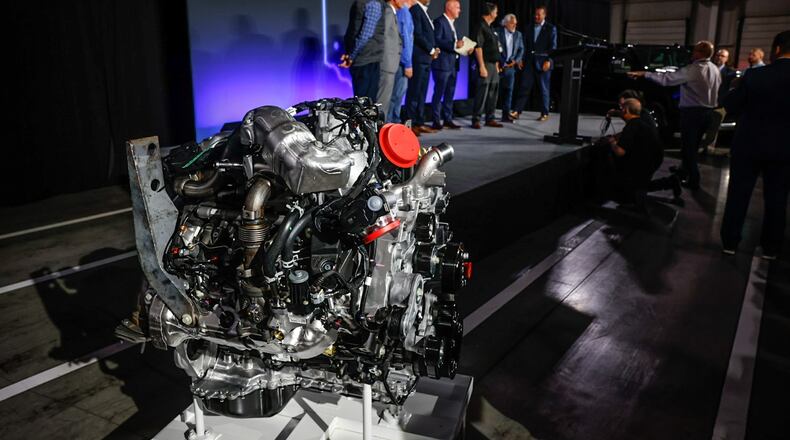DMAX has dual Dayton-area plants, the original plant in Moraine and a much newer one in Brookville, making Duramax diesel engines for heavy-duty General Motors and Chevrolet trucks and vehicles.
Long before a UAW strike became a possibility, the Moraine plant was oriented toward likely closure or repurposing at some point, thanks to GM’s expansion of the Brookville operation. In June a GM executive declined to say when that could happen.
“DMAX is represented by the IUE-CWA and has a separate contract from the GM-UAW national labor agreement,” GM spokesman David Barnas said in response to questions from this news outlet. “Essentially, DMAX is a supplier to (GM’s) Flint Assembly (plant).
“In the event of a UAW strike that affects Flint, DMAX would run as long as they could,” he added.
Credit: JIM NOELKER
Credit: JIM NOELKER
The UAW initially sought a 46% pay raise, a 32-hour week with 40 hours of pay and a restoration of traditional pensions in talks with GM, Stellantis and Ford, the Associated Press has reported.
Contract talks are happening as U.S. automakers are facing growing government expectations — and in some cases, requirements — to shift away from internal combustion engine (ICE) automobiles to electric vehicles (EVs).
One challenge inherent in that shift: Ford CEO James Farley has said that EVs will require 40% less labor to produce than traditional ICE cars.
“We are not in a position to answer that question at this point in time,” GM’s Barnas said when asked how long DMAX would operate in the event of a strike. “Importantly, the GM and UAW bargaining teams have been working hard, including through this past weekend, to continue to address the issues most important to our team members.
“Our goal remains the same, to achieve an agreement that rewards our team members while allowing us to pursue our growth strategy through continued investment in our U.S. manufacturing operations and American jobs,” he said.
An assistant to IUE-CWA President Carl Kennebrew referred questions about the situation to Michael Gross, president of IUE-CWA Local 755, whose members include DMAX employees. Messages seeking comment were left for Gross and a spokesman for the UAW.
At the time, more than 600 DMAX workers and about 15 General Engine Products workers were idled.
“Everybody is anxious to get back to work,” Gross said at the time. “We’re all supporting the UAW members.”
Since 1998, DMAX had been a 60-40 joint venture of GM and Isuzu, with GM being the majority owner. The original DMAX plant in Moraine built more than 2 million heavy-duty engines in the two decades between 1999 and 2019.
Isuzu quietly ended its role in the joint venture last year in financial filings. DMAX is wholly owned by GM today.
About the Author


